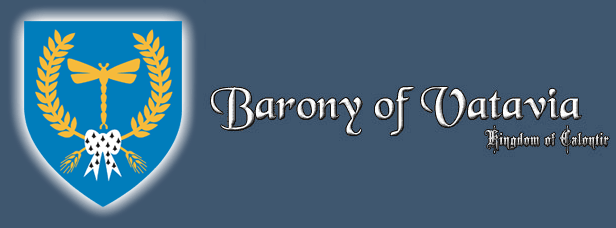
History as Re-Enactment
by Friar Thomas Bacon (David Moreno)
Orignally published in the September 2001, A.S. XXXVI issue of the Dragonflyre, a publication of the Barony of Vatavia.
Broadly speaking history is defined as the study of past events. Yet this is often narrowly construed to be nothing more then a recitation of lists of names, places, events. And Iím sure we can all testify that is history at its most boring. History comes alive when we go behind these lists and discovery why these people did these events at these places. And there lies the true object of history. We now get to the question of what do we mean to understand these happenings. And this is the philosophy of history. Here there are two strands of thought, which could be broadly summarized as history of the particular and history of the general. This essay will explore one theory of the history of the particular and what it means to the practice of the SCA.
Before I get into the theory of interest, let me explain what is meant by history of the general. These particular theories are patterned off what are referred to the hard sciences of physics, chemistry and mathematics. The basic thrust is to create an overarching rule that ties together some set of actives that in some sense explain why these actives took place when and how they did. The overused metaphor is "the tide of history". The most notorious of these theories is the one by Karl Marx, which formed the foundation of his political ideas. The best exploration of this mode of thinking is the "Foundation" series of stories by Isaac Asimov that revolves around the theory of history by the character Hari Seldon.
The theory to be explored here is very much in opposition to such theories. This one was put forth by R.G. Collingwood, a somewhat obscure Oxford don of the 1920ís and 30ís. His basic premise is that to understand history you must be able to re-enact the thoughts of the actors of history. Unfortunately for those followed him, he never did lay out a clear presentation of what he meant and how to carry it out. And therefore were forced to tease this out from what he wrote as his thinking evolved. Nevertheless, his is a very influential work in the philosophy of history.
The basic scheme is that there are two parts to every historical event. First there is the physical act itself, and then there is the thought behind the act, which is the cause of the act. According to Collingwood, it is these thoughts that are the proper subject of the historian. And so to properly understand history you must know these thoughts. And to know they means to re-enact them, to think them anew.
The challenge is not what you would have thought had you been in that historical actorís place, but to think as that actor did think. Now stated in that manner implies an act of psychic ability. In practice, what this really means that, you construct the circumstances that the actor found himself in well enough that, knowing how he did act, you can reconstruct what he must have thought in order to take that act. The implicit assumption is that the actor is rational within his belief structure and his perceptions of the circumstances in which he finds himself. This is separate from whether or not the actor is rational in an objective sense. Hitler was a madman, yet he acted rationally in concordance with his twisted worldview.
Now, obviously it not possible to know all the thoughts of all the people that lived. Nor is it necessary. Just as it is not necessary to know all the actions of all the soldiers to understand the course of a battle. But you do need to know how a generic solder would act to make sense why the army moved the way it did.
In this view, history is an emergent story arising from the collective efforts of individuals. Not all of them conscious of the effects they are having, nor succeeding with their intent. There is no hidden hand directing the plot of the story. The larger structures of history that we see are the result of the interplay of people having similar experiences.
So what does this have to do with the SCA? It cuts to the heart of what the SCA is about. Our shorthand description is "we attempt to recreate the Middle Ages". But what does this mean? It means going beyond dressing up in funny clothes to party on the weekends, though there are plenty in the Society for whom that it means. It means going beyond waving gaudy up sticks or talking using archaic terms, though we are all guilty of play acting in this manner. It means understanding our predecessors that we can think like them, and so act like them.
Now the game the Society plays has its natural limits. The ruling nobles do not have the power of life and death over the subjects, nor can they compel them to act. But to properly play the game we must think and therefore act as if they do. This is not an easy thing to do, for we are modern Americans trying to be medieval Europeans. Behaviors acceptable in one context are not necessarily in the other. As modern Americans we have certain rights, rights as medieval Europeans we would not have. The phrase "the Society is not a democracy" is a shorthand way of acknowledging this dichotomy. Thus, if properly played, the Society can not only teach us how our ancestors lived, but also give us a better appreciation of what we as Americans have.
Bibliography
Dray, William H. History as Re-Enactment: R. G. Collingwood's Idea of History. New York: Oxford University Press, 1995.
Copyright © 1997 - present His Lordship Friar Thomas Bacon (David Moreno). All rights reserved.